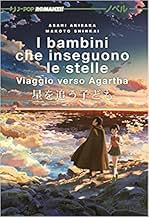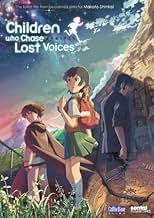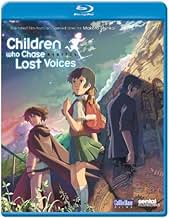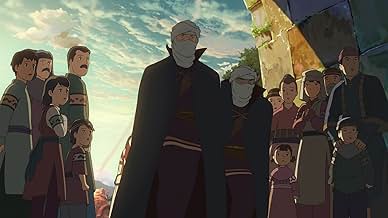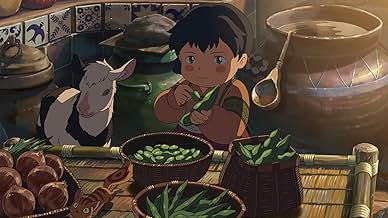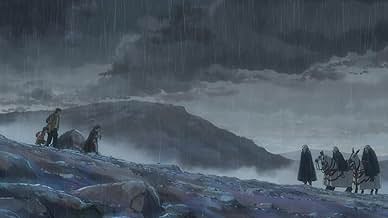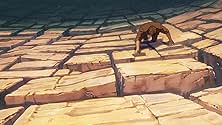AVALIAÇÃO DA IMDb
7,1/10
18 mil
SUA AVALIAÇÃO
Uma história envolvendo amor jovem e música misteriosa, vinda de um rádio de cristal deixado como lembrança por um pai ausente, que leva uma jovem heroína ao fundo de um mundo escondido.Uma história envolvendo amor jovem e música misteriosa, vinda de um rádio de cristal deixado como lembrança por um pai ausente, que leva uma jovem heroína ao fundo de um mundo escondido.Uma história envolvendo amor jovem e música misteriosa, vinda de um rádio de cristal deixado como lembrança por um pai ausente, que leva uma jovem heroína ao fundo de um mundo escondido.
- Prêmios
- 1 vitória e 7 indicações no total
Hisako Kanemoto
- Asuna Watase
- (narração)
Miyu Irino
- Shin
- (narração)
- …
Kazuhiko Inoue
- Ryûji Morisaki
- (narração)
Junko Takeuchi
- Mimi
- (narração)
Fumiko Orikasa
- Asuna no haha
- (narração)
Sumi Shimamoto
- Risa Morisaki
- (narração)
Tamio Ôki
- Amorôto no rôjin
- (narração)
Aki Kanada
- Seito
- (narração)
- (as Aki Kaneda)
Ai Horanai
- Seito
- (narração)
Saya Horigome
- Seito
- (narração)
Mayumi Tsuchiya
- Seito
- (narração)
Mao Kobayashi
- Seito
- (narração)
- (as Satomi Saitô)
Naomi Matamura
- Murabito
- (narração)
Mariko Nagahama
- Murabito
- (narração)
Mika Ishibashi
- Murabito
- (narração)
Hiroko Midorikawa
- Murabito
- (narração)
Yûtarô Honjô
- Murabito
- (narração)
Hiroshi Shimozaki
- Murabito
- (narração)
Avaliações em destaque
Every culture has a story about the Underworld, where the souls of the dead reside and where, sometimes, the living can find their way in hopes of bringing a loved one back to life. In "Children Who Chase Lost Voices from Deep Below," Agartha is the name of that Underworld, and when young Asuna (voiced by Hisako Kanemoto) finds herself interacting with a boy from Agartha, Shun (voiced by Miyu Irino), her whole world is changed. Shun saves her from a frightening creature, but then he himself is killed. In the meantime, the substitute teacher taking over for the regular teacher of Asuna's class, Mr. Morisaki (voiced by Kazuhiko Inoue), is all-too-familiar with stories from and about Agartha, and he is determined to get there in order to bring his wife, dead 10 years, back to the world of the living. But the balance of all the worlds depends on such things not happening, and there are many forces arrayed against Mr. Morisaki and young Asuna who has willingly joined him in his quest, for she hopes to find a living Shun. Instead she finds Shun's younger brother, Shin (also voiced by Miyu Irino), whose loyalties and desires are not perhaps favourable to Asuna....
Anime is Japan's version of "cartoons," although they tend to be much more complex and beautiful than Hanna-Barbera ever thought of, and this is one very beautiful piece of work. The images are exquisite and the colours are wonderful, the underworld of Agartha is just as real as the everyday world Asuna initially inhabits. And the storyline, essentially a meditation on letting go of the past while still being free to mourn lost loved ones, is much more resonant for adults than for kids. The writer and director, Makoto Shinkai, has been compared with the great anime master, Hayao Miyazaki, and while those are mighty shoes indeed to fill, Shinkai's work has the same kind of gentleness and beauty; he is surely a talent to watch for in the coming years. A beautiful film, and well worth seeking out.
Anime is Japan's version of "cartoons," although they tend to be much more complex and beautiful than Hanna-Barbera ever thought of, and this is one very beautiful piece of work. The images are exquisite and the colours are wonderful, the underworld of Agartha is just as real as the everyday world Asuna initially inhabits. And the storyline, essentially a meditation on letting go of the past while still being free to mourn lost loved ones, is much more resonant for adults than for kids. The writer and director, Makoto Shinkai, has been compared with the great anime master, Hayao Miyazaki, and while those are mighty shoes indeed to fill, Shinkai's work has the same kind of gentleness and beauty; he is surely a talent to watch for in the coming years. A beautiful film, and well worth seeking out.
This film was a pleasant surprise to find and watch. The story is compelling, the Japanese voice acting is excellent, and the level of imagination is fantastic.
I was struck by the sheer attention to detail in this film: gradual changes in daylight within individual scenes, subtle dirt and weathering, precise animation of water effects, accurate animation of wildlife, and excellent use of light and color. These little extras did not go unnoticed. All of this helps to create a richer visual experience.
The characters were interesting and quite nuanced and the musical score suits the film well.
Now here's what really surprised me.... This is the director's first full-length feature and first time working with the larger-scale studio system. Couple this with the fact that he's a young director and you have someone with a very strong career ahead of him.
The style of this film is similar to that of Miyazaki, and this is intentional. Miyazaki's style was chosen because it is recognized worldwide and it has proved itself effective for dramatic story-telling. Watching the behind-the-scenes information for this film was fascinating and it was amazing to see how young the crew were. Certainly there is a great deal of talent in Japan today -- talent willing to make 'classic' high-production-value anime. And for that I'm grateful. The next generation is sure to enjoy animation of the level that I enjoyed in my youth.
In summary, I like this film a lot and I highly recommend it. If I were to nitpick this movie, I'd say that a few scenes were cut short a tiny bit too soon. I recommend the director watch the director's commentary for Star Wars: The Empire Strikes Back. In there is a discussion about holding the camera at the end of a scene and why it's important for dramatic shots. I should also mention that although this is an animated film, there are scenes of violence and some sequences that children may find frightening.
So if you're a fan of Miyazaki's work or simply a fan of imaginative drama and fantasy films, be sure to check this one out.
I was struck by the sheer attention to detail in this film: gradual changes in daylight within individual scenes, subtle dirt and weathering, precise animation of water effects, accurate animation of wildlife, and excellent use of light and color. These little extras did not go unnoticed. All of this helps to create a richer visual experience.
The characters were interesting and quite nuanced and the musical score suits the film well.
Now here's what really surprised me.... This is the director's first full-length feature and first time working with the larger-scale studio system. Couple this with the fact that he's a young director and you have someone with a very strong career ahead of him.
The style of this film is similar to that of Miyazaki, and this is intentional. Miyazaki's style was chosen because it is recognized worldwide and it has proved itself effective for dramatic story-telling. Watching the behind-the-scenes information for this film was fascinating and it was amazing to see how young the crew were. Certainly there is a great deal of talent in Japan today -- talent willing to make 'classic' high-production-value anime. And for that I'm grateful. The next generation is sure to enjoy animation of the level that I enjoyed in my youth.
In summary, I like this film a lot and I highly recommend it. If I were to nitpick this movie, I'd say that a few scenes were cut short a tiny bit too soon. I recommend the director watch the director's commentary for Star Wars: The Empire Strikes Back. In there is a discussion about holding the camera at the end of a scene and why it's important for dramatic shots. I should also mention that although this is an animated film, there are scenes of violence and some sequences that children may find frightening.
So if you're a fan of Miyazaki's work or simply a fan of imaginative drama and fantasy films, be sure to check this one out.
"Your Name" ended up being one of my favorite movies of last year, and one of my favorite anime of all time, so I went into this film with relatively high expectations, and as a result, I was slightly disappointed. Don't get me wrong; this movie has a lot of things going for it. I loved the melancholic, almost lazy piano music that plays for the majority of the film- it creates a magical atmosphere that works wonders with the animation style and overall arc of the story. The way that characters and creatures are designed is memorable, and sometimes it's even a little bit frightening and bizarre, but that totally worked for me. The landscapes are beautiful and sometimes strange (though we never quite reach the level of artistic mastery that came with "Your Name"). There were some parts where I really felt for the characters, and then there were other times when I was quite bored.
Since Hoshi no koe I've been a big fan of Makoto Shinkai and I always find his movies so beautiful that make him the only anime producer who is comparable with Miyazaki Hayao. For his latest work "Children who chase voice from deep below", the story settings and the characters are quite different from his previous works. The idea is likely inspired by the many old myths like the story of Orpheus, who traveled to the underworld and by his music softened the hearts of Gods. Yet "Children who chase voice from deep below" keeps on the track with Shinkai's previous works in discussing loneliness of human beings, but unlike "5 centimetres per second", with hope and love this time.
The music, once again, is perfect and the scenes are delicate and tender. When watching this you find yourself immersed in a dream-like situation where the sky and the trees and the world are of the beauty that far beyond your imagination. Shinkai created perfect environments, the moving wind and the colourful insects, every single detail in every single scene is fantastic. The plot line is a romantic imagination. It portrays a journey of finding hope and love after the every loss throughout our life. It's a reflection of life with fantasy elements. To recover from immense sorrow and stand up again and look forward to the future. I love the message the movie brought to me. However, the story does have flaws. The pace of some parts is too slow while of some parts is too fast. It can be explained by looking at the length of the movie, which is of the longest in Shinkai's works. And obviously, he still has to look for better ways to deal with a "long" movie. Besides it is a pity that Shinkai abandons his talent on talking about modern city life but tries to give a tribute to Miyazaki Hayao by duplicating many elements in Ghibli's anime movies. I have this impression because while watching I thought of Miyazaki Hayao's works like "Princess Mononoke" and "Laputa" in several occasions, yet not as good as those works. A good try with rooms for improvement. After all,however, I still love this film. It reminds me of the beauty in our life. I am particularly touched while on the edge of death the girl Asuna recounts every person in her life she is loved by and says, "After all it was only because of my loneliness." It moves me so much that how our every day will be if we treasure the people still beside us instead of looking for someone or something that is so abstract and beyond our reach. If you love Shinkai, go watch it. It is, definitely, a touching piece for all of us.
The music, once again, is perfect and the scenes are delicate and tender. When watching this you find yourself immersed in a dream-like situation where the sky and the trees and the world are of the beauty that far beyond your imagination. Shinkai created perfect environments, the moving wind and the colourful insects, every single detail in every single scene is fantastic. The plot line is a romantic imagination. It portrays a journey of finding hope and love after the every loss throughout our life. It's a reflection of life with fantasy elements. To recover from immense sorrow and stand up again and look forward to the future. I love the message the movie brought to me. However, the story does have flaws. The pace of some parts is too slow while of some parts is too fast. It can be explained by looking at the length of the movie, which is of the longest in Shinkai's works. And obviously, he still has to look for better ways to deal with a "long" movie. Besides it is a pity that Shinkai abandons his talent on talking about modern city life but tries to give a tribute to Miyazaki Hayao by duplicating many elements in Ghibli's anime movies. I have this impression because while watching I thought of Miyazaki Hayao's works like "Princess Mononoke" and "Laputa" in several occasions, yet not as good as those works. A good try with rooms for improvement. After all,however, I still love this film. It reminds me of the beauty in our life. I am particularly touched while on the edge of death the girl Asuna recounts every person in her life she is loved by and says, "After all it was only because of my loneliness." It moves me so much that how our every day will be if we treasure the people still beside us instead of looking for someone or something that is so abstract and beyond our reach. If you love Shinkai, go watch it. It is, definitely, a touching piece for all of us.
So I guess I wasn't the only one really excited about Shinkai's new release, "Hoshi o ou Kodomo". With his previous work like "Kumo no mukô, Yakusoku no Basho", "Byôsoku 5 Senchimêtoru" and "Hoshi No Koe" Makato Shinkai has never ceased to impress us with the visual detail and animated scenery, a wonderful blend of color and light that breathes life into the dreamlike landscapes. If you're familiar with his previous films you know what to expect visually, but now to the actual content.
Unfortunately, "Hoshi o ou Kodomo" doesn't share the same uniqueness as say "Kumo no mukô, yakusoku no basho" and "Hoshi No Koe". I could notice resemblance and inspiration from a couple of films, especially Miyazaki's "Spirited Away" and "Princess Mononoke". I even thought of Andrei Tarkovsky's "Stalker" at some points, with the resemblance of the two main characters setting out on a journey through unknown, otherwordly plains, being lonely and in mourning, seeking to make their strongest wishes come true. This is of course the case in most films and in the creation of any aesthetic work, the artist creates something new under the influence of others whether they want it or not. Especially when it comes to film, which affect us on many levels, changing our thought patterns and point of view. The story was compelling and had me engaged from beginning to end. I'm weak when it comes to these spiritual and existential messages and symbolism often presented in Japanese cinema, especially in animations.
"Hoshi o ou Kodomo" is certainly no exception with a centered theme of life and death and the mysterious rumours of a world within the Earth, a place where ancient knowledge and memories dwell, and ancient divine entities wander the land, who used to give guidance to humankind. This film can be interpreted in many different ways, this was mine. The soundtrack is both ethereal and powerful, intertwining with the visuals in a flawless way.
To summarize, Shinkai's new work is a touching and compelling tale of friendship, love and hatred, truth, deceit, but foremost about letting go.
"Hoshi o ou Kodomo" is without any doubt a worthy addition to Makato Shinkai's previous works.
My rating: 8/10
Unfortunately, "Hoshi o ou Kodomo" doesn't share the same uniqueness as say "Kumo no mukô, yakusoku no basho" and "Hoshi No Koe". I could notice resemblance and inspiration from a couple of films, especially Miyazaki's "Spirited Away" and "Princess Mononoke". I even thought of Andrei Tarkovsky's "Stalker" at some points, with the resemblance of the two main characters setting out on a journey through unknown, otherwordly plains, being lonely and in mourning, seeking to make their strongest wishes come true. This is of course the case in most films and in the creation of any aesthetic work, the artist creates something new under the influence of others whether they want it or not. Especially when it comes to film, which affect us on many levels, changing our thought patterns and point of view. The story was compelling and had me engaged from beginning to end. I'm weak when it comes to these spiritual and existential messages and symbolism often presented in Japanese cinema, especially in animations.
"Hoshi o ou Kodomo" is certainly no exception with a centered theme of life and death and the mysterious rumours of a world within the Earth, a place where ancient knowledge and memories dwell, and ancient divine entities wander the land, who used to give guidance to humankind. This film can be interpreted in many different ways, this was mine. The soundtrack is both ethereal and powerful, intertwining with the visuals in a flawless way.
To summarize, Shinkai's new work is a touching and compelling tale of friendship, love and hatred, truth, deceit, but foremost about letting go.
"Hoshi o ou Kodomo" is without any doubt a worthy addition to Makato Shinkai's previous works.
My rating: 8/10
Você sabia?
- CuriosidadesBefore the film's release in May 2011, manga adaptations were set to begin serialization in April 2011
- Trilhas sonorasHello Goodbye & Hello
Lyrics & Music by Anri Kumaki
Arranged by Shun'ya Shimizu
Performed by Anri Kumaki
Principais escolhas
Faça login para avaliar e ver a lista de recomendações personalizadas
- How long is Children Who Chase Lost Voices?Fornecido pela Alexa
Detalhes
- Data de lançamento
- País de origem
- Central de atendimento oficial
- Idiomas
- Também conhecido como
- Children Who Chase Lost Voices
- Empresas de produção
- Consulte mais créditos da empresa na IMDbPro
Bilheteria
- Faturamento bruto mundial
- US$ 645.560
- Tempo de duração
- 1 h 56 min(116 min)
- Cor
- Mixagem de som
- Proporção
- 1.85 : 1
Contribua para esta página
Sugerir uma alteração ou adicionar conteúdo ausente


